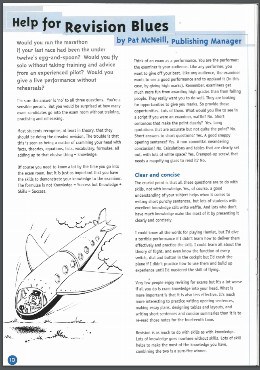Following on from our previous study tips post, for today’s blog we’re sharing some thoughts from our magazine on why preparation for exams should focus on more than just knowledge — advice which is as relevant today as it was when it was first published. Enrolled NEC students can also find a scanned copy of the original publication on learn@nec.
Would you run the marathon if your last race had been the under twelve’s egg-and-spoon? Would you fly solo without taking training and advice from an experienced pilot? Would you give a live performance without rehearsals?
I’m sure the answer is ‘no’ to all three questions. You’re a sensible person. But you would be surprised at how many exam candidates go into the exam room without training, practising and rehearsing.
Most students recognise, at least in theory, that they should be doing the dreaded revision. The trouble is that this is seen as being a matter of cramming your head with facts, theories, equations, lists, vocabulary, formulae, all adding up to that elusive thing — knowledge.
Of course you need to know a lot by the time you go into the exam room, but it is just as important that you have the skills to demonstrate your knowledge to the examiner. The formulae is not Knowledge = Success but Knowledge + Skills = Success.
Think of an exam as a performance. You are the performer: the examiner is your audience. Like any performer, you want to give off your best. Like any audience, the examiner wants to see a good performance and to applaud it (in this case, by giving high marks). Remember, examiners get much more fun from awarding high grades than from failing people. They really want you to do well. They are looking for opportunities. Lots of them. What would you like to see in a script if you were an examiner, waffle? No. Short sentences that make the point clearly? Yes. Long quotations that are accurate but not quite the point? Nio. Short answers to short questions? Yes. A good snappy opening sentence? Yes. A non-committal meandering conclusion? No. Calculations and tables that are clearly set out, with lots of white space? Yes. Cramped-up scrawl that needs a magnifying glass to read it? No.
Clear and concise
The crucial point is that all these questions are to do with skills, not with knowledge. Yes, of course, a good understanding of your subject helps when it comes to writing short punchy sentences, but lots of students with excellent knowledge skill write waffle. And lots who don’t have much knowledge make the most of it by presenting it clearly and concisely.
I could know all the words for playing Hamlet, but I’d give a terrible performance if I didn’t learn how to deliver them effectively and practice the skill. I could learn all about the theory of flight, and even know the function of every switch, dial and button in the cockpit but I’d crash the plane if I didn’t practice how to use them and build ujp experience until I’d mastered the skill of flying.
Very few people enjoy revising for exams but it’s a lot worse if all you do is cram knowledge into your head. What is more important is that it is also less effective. It’s much more interesting to practice writing opening sentences, making essay plans, designing tables and layouts, and writing short sentences and concise summaries than it is to re-read those notes for the fourteenth time.
Revision is as much to do with skills as with knowledge. Lots of knowledge goes nowhere without skills. Lots of skill helps to make the most of the knowledge you have, combining the two is a sure-fire winner.


Add a new comment
Current comments: 0